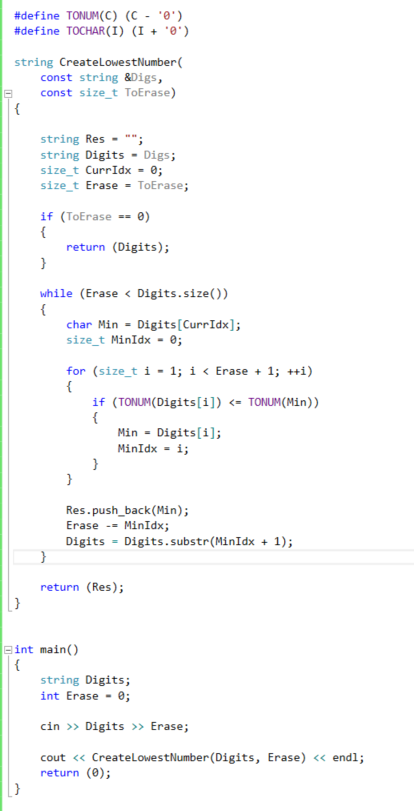Uwaga
Dostęp do tej strony wymaga autoryzacji. Może spróbować zalogować się lub zmienić katalogi.
Dostęp do tej strony wymaga autoryzacji. Możesz spróbować zmienić katalogi.
The following fun problem is defined as followed:
Given a string of digits S and a number K, return the smallest integer number that can be created by deleting K digits from S while preserving the relative locations of the digits.
As an example Lets assume S = "914123107" and K = 3, the result should be "112107". if S = "19819934101" K = 6 , the result should be: 11101.
Lets design the algorithm using our inductive approach on the size of S = N. we will denote P(1,N,k) - our final result of finding a string representing the smallest number using digits from S[1,N] by deleting K characters.
Our first non trivial base case is obviously for N equal to K + 1. It is easy to see that for N <= K the result is the empty string. So for P(i,i + K+1,K) we will only return a string with a single digit. That is the smallest digit out of the K + 1 digits of S.
Lets assume that we can solve P(1,n < N, K) for all K.
How do we solve P(1,N,K) = ?
We first as always need to reduce the problem size in a smart and efficient way. Let the result of P(1,n < N,K) be a string S'[1...i]. The number of digits that we erased from S to get to S' is K, however some of these erased digits (especially those that follow i in S) can still be part of our solution. So we can't ignore digits i through N. However, all the digits before i in S that do not appear in S' can't be used anymore. Let the total number of these digits be K'.
So we can remove them from our general count of K and get a smaller problem P(i,N, K - K'). The problem is that our hypothesis is not strong enough to give us this ability, and hence we need to strengthen it to give us back i and K'.
P(1,n< N, K) - we know how to return a string representing the smallest number created from characters in S[1...n] after erasing K characters, and return the index i of the last character of the result in S as well as the total number of characters that come before i in S, K'. Now that we have a stronger induction hypothesis, we can reduce the problem from P(1,N,K) to smaller sub problems. We start by looking at the char representing the smallest digit in a window of the first K + 1 chars of S. let the index of this char be i. Based on our previous discussion we know that the first i characters are not part of the solution and so we reduce the problem to P(i + 1,N - i,K - i). According to our induction hypothesis we know how to solve this problem. Let S' be the solution of this problem, all that is left is to append S[i] to the front of S' and we have our solution.
What is the run time of this algorithm ? Finding the first character takes at most K + 1 steps. The number of iterations is at most N - K - 1. Hence, we have a total of (K + 1) * (N - K - 1) steps which give us O(K * N).
Lets now view the code:
The outer while loop terminates after our base case, that is when K is greater or equal to S. Inside that loop we find the index of the minimum digit character in a K + 1 windows. We insert that character to the result, and proceed by updating the string S (named digits) to reflect the next sub problem to be solved as well as decrease K by the number of characters that came before the index i that we found.
